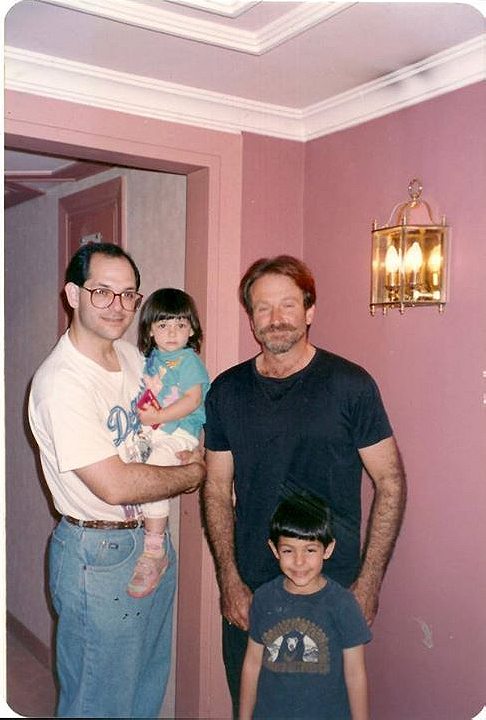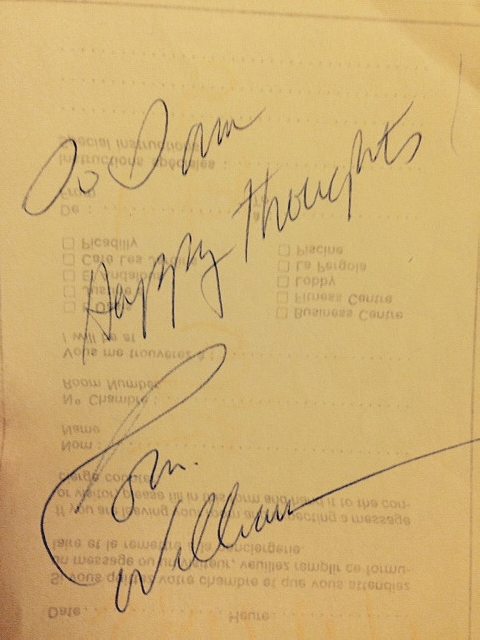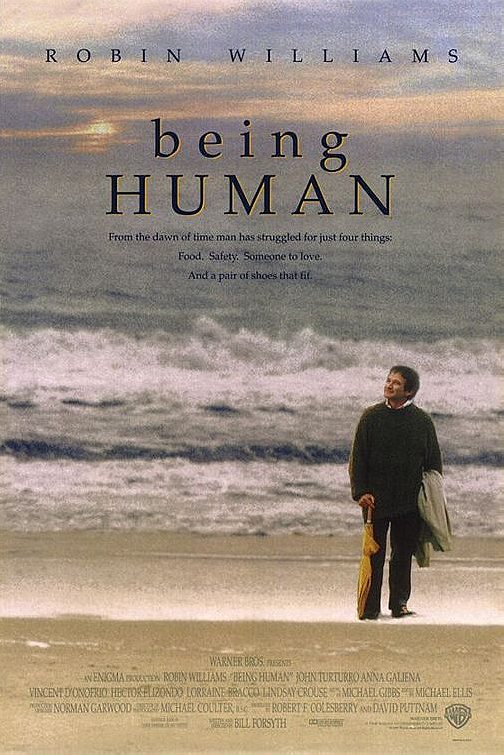As a five-year-old boy, Sam Dreiman saw first hand the two sides of the melancholic Robin Williams during a chance encounter at a hotel in Morocco.
My father moved our family to Rabat, Morocco, in early October 1992. He had accepted a posting on a USAID-funded project to help Moroccan small businesses. While my dad worked, my mother would have her hands full with my baby sister, Ally, who was two at the time, and with me, a five-year-old about to start kindergarten. It wouldn’t be easy, but as a family we were drawn to the exoticism of the opportunity—the allure of sweet mint tea and steaming tagine stew, and the hypnotic dreams of camel-backing across the Sahara.
We stayed at the Rabat Hyatt Hotel while my father searched for a house to rent. It wasn’t long before my parents found out, much to their surprise and excitement, that the one and only Robin Williams was also staying at the hotel. He was in Morocco filming “Being Human,” a fantasy drama about the experience of the same soul through various incarnations. With him were his wife at the time, Marsha Garces Williams, his two small children, Zelda and Cody (three- and one-year-old, respectively), and two nannies. (Robin’s oldest child, Zak, arrived later during in his stay in Rabat.)
While I was in school and my dad worked, my mother and sister would go to the park adjacent to our hotel to collect pinecones. They would bring them home for Ally to paint or decorate with glitter. One day in the park, they ran into one of the nannies with Zelda. Being a typical gregarious and generous Jewish mother, my mom offered to bring over Kraft mac n’ cheese for the girls as long as she could cook it in the Williams’ suite apartment.
After the meal was prepared and served, Marsha walked into the apartment while Ally and Zelda were eating. I remember my mom saying that although Marsha’s initial reaction was a mixture of confusion and mild hostility (“Who are you and why are you cooking in my kitchen?”), she became quickly at ease when she saw the mac n’ cheese and learned we were American and that Zelda liked playing with Ally. It turned out the Williams were not huge fans of Moroccan food, especially bisteeya, a chicken and almond filo pie that they’d heard was traditionally made with pigeon.
I have faint memories, confirmed by my parents, of seeing Robin eating breakfast in the mornings in the hotel lobby, which we would pass on my way to catch the school bus. Sometimes he would eat with the crew, more often alone. Robin usually appeared quiet, drinking coffee and eating fresh fruit. He would then leave with his driver for the small town of Kenitra, where they would film on the beach and in other areas nearby.
Leslie Nielsen was heavily intoxicated and could not stop farting
My father recalls returning from the office in the late afternoon and sometimes seeing Robin sitting alone, sipping a café au lait. He always seemed subdued and removed. My father never wanted to bother him for an autograph or photo, always mindful of his privacy. But after noticing the warm receptions Robin granted others who approached him for a picture, my father went up to him the next day and told him we were also living in the hotel and that our kids played together. My father asked if he would mind taking a photo with us. Robin graciously said, sure, come by his room on Sunday morning at around 11:00 am.
We went to his room that Sunday and knocked on the door. Robin opened up wearing just his pajama bottoms, showing off his bare, hairy-like-an-ape barrel chest (which ultimately became one of his trademarks) with a Q-tip sticking out of each ear. He told us to hold on a minute while he put on a shirt. He came out into the hallway in front of his room, where my mother snapped a picture of the four of us.

The culminating moment in my father’s legendary tale came when he walked into the hotel elevator one evening followed by Robin, Leslie Nielsen (of “Airplane!” fame) and Leslie’s wife. Leslie was heavily intoxicated—or “stupid drunk,” in my father’s words—and could not stop farting. His wife was embarrassed and told him to stop. As if on cue, Robin flipped on his inner comedic switch and began to imitate a news broadcaster with Leslie responding, also on cue, to each line with a fart exclamation point. Robin said something about Saddam Hussein, and Leslie farted; Robin commented on U.S. politics, and Leslie farted. My father stood in the back corner of the elevator trying hard not to burst out laughing.
As the elevator door opened on our floor, my father said Robin simply flipped the funny switch back off, as seamlessly as he’d turned it on. Robin said goodnight to Leslie and his wife. As the two of them and my father walked out of the elevator Robin retreated to his private space, almost in an instant. Leslie continued to fart down the hallway, with my father trailing behind (more likely in amusement than disgust). As his wife opened the door, he let one go one last time, and again she told him to stop before closing the door.
My father never forgot those few moments in the elevator. He still marvels today at how he witnessed Robin turn on his comic genius in a microsecond, make an elevator explode in laughter, and then, just as fast, turn it off and recede back into himself.
As I, along with the rest of the world, try to reconcile with the news of Robin’s passing, I think back to my favorite part of my father’s story, which took place after my mom took the photo. Robin told us all to wait a minute. He went back into his room and came out with a piece of paper, on which he wrote, recalling his earlier role of Peter Pan, “To Sam, Happy Thoughts – Robin Williams.”

Top image: Rabat Lighthouse, Morocco. Photo by: Nedim Chaabene
